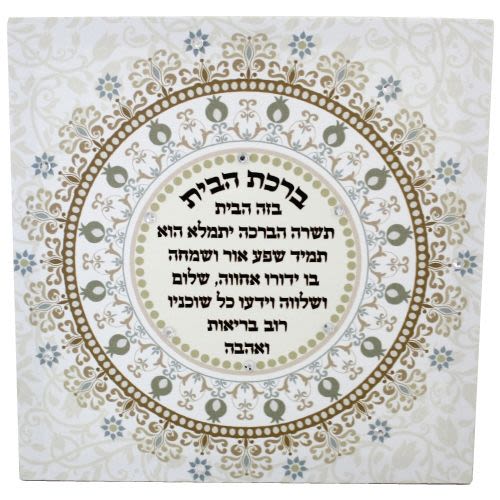
Hitbodedut – Personal Prayer
Rebbe Nachman teaches that the main "weapon" of Mashiach–and of every Jew - is prayer. Every tefilah (prayer), every bracha (blessing), every whispered thanks...

To read more about personal prayer, click here to view more articles.
Hitbodedut – Personal Prayer
Rebbe Nachman teaches that the main “weapon” of Mashiach–and of every Jew – is prayer. Every tefilah (prayer), every bracha (blessing), every whispered thanks, every Psalm and every hitbodedut (private, secluded prayer in one’s own words) brings the geulah (Redemption) that much nearer.
The intrinsic power of sincere and heartfelt prayer is beyond our comprehension. One of Rebbe Nachman’s greatest legacies to us is his teachings on hitbodedut in addition to formal prayer.
What is hitbodedut? Secluded meditation with G-d. During hitbodedut, we speak to G-d, ask Him for whatever we need, confess our wrong-doings and thank Him for all the good that He has done for us.
When we take time out of our busy lives to be alone with our Creator, to pour out our hearts to Him, to ask Him for guidance and forgiveness and share our troubles with Him, we are binding with the Almighty through bringing Him into our daily lives.
Hitbodedut is a powerful tool in our spiritual growth. Rebbe Nachman’s primary disciple, Reb Noson, wrote:
The Rebbe attained what he did was simply through prayer and supplication before G-d. He was very consistent in this. He would beg and plead in every way possible, asking G-d to be kind to him and bring him to genuine closeness and devotion. What helped him most were his prayers in his own native language, which was Yiddish. He would find a secluded place and spend time expressing all his thoughts to G-d. Speaking in his own language, he would beg and plead with G-d. He would use every kind of argument, pleading with G-d to draw him closer and help him in his devotions. He kept this up constantly, spending days and years engaged in such prayer. All his prayers had one goal: that he should come closer to G-d. Praises of Rabbi Nachman #10-11
The Rebbe “was very consistent in this.”
He (Rebbe Nachman) would often walk in the woods and fields and seclude himself in prayer. I once walked with the Rebbe through Medvedevka, where he lived earlier. We strolled all through the fields and hills. The Rebbe gestured toward the hills and meadows and said, “See all these fields and hills around the city. See all the other places near the town. I’ve been in all of those places. I’ve been to each one of them many times and secluded myself in prayer.” Rebbe Nachman’s Wisdom #227
Rebbe Nachman defined the goal and method of hitbodedut in the following teaching:
The only way to return to the roots of one’s being and merge in the unity of G-d is through nullifying the self…
True hitbodedut is practiced in the depths of night, at an hour when everyone is free from their toil in the material world. During the day, people are so busy chasing after the material world that it distracts the spiritual seeker from attaching himself to G-d. Even if he personally is quite detached from the material world, the mere fact that everyone else is then busy chasing after the vanity of the world makes it very difficult to attain self-transcendence at such a time.
Hitbodedut should also be practiced in a special place outside the city on a ‘solitary path’ (Avot 3:5) in a place where no one goes. For in a place where in the daytime hours people are busy chasing after the vanity of the world, even though they may not be there at this hour, it is still a distraction from hitbodedut, making it impossible for the spiritual seeker to attain the state of total communion with G-d.
For this reason, it is necessary to go alone at night on a solitary path to a place where on one goes even by day. There one should seclude oneself and empty one’s heart and mind of all worldly involvements until one attains the state of true self-transcendence and communion.
This is a step by step process. First, the person should devote this solitary nighttime hitbodedut to talking and praying to G-d at length, until he succeeds in nullifying one negative trait or desire. Next, he should devote his hitbodedut to working on nullifying a second trait or desire. He should go on like this night after night in this solitary spot until he nullifies everything.” Likuty Moharan I,52
Although it’s preferable to find an isolated spot to pour out our hearts to G-d, hitbodedut can be done anywhere – in the kitchen, while lying in bed, sitting on the living room sofa. The most important thing to remember is to take time out of our busy schedule to communicate with the Creator.
One of Rebbe Nachman’s followers complained to the Rebbe about the difficulties he encountered in serving G-d. The man blamed his difficulties on his house being too crowded and not having a private room for his devotions. The Rebbe answered, “Presumably, if G-d agreed that the only possibility of your serving Him depended on your having such a room He would have already given it to you!” Tzaddik #588
After Rebbe Nachman’s passing, Reb Noson moved (from his birthplace, Nemirov) to Breslov. At first, he rented a one-room apartment in someone else’s house. However, this soon proved inconvenient and he prayed to G-d for better accommodations. His prayers were answered and he was able to move into his own quarters. Yet even this new apartment had no private room where Reb Noson could practice hitbodedut and study Torah. Having no better alternative, he erected a room divider in the corner of the kitchen. It wasn’t perfect, and he was often interrupted by his children, but at least it was “his own four ells.” Things stayed this way until many years – and many prayers – later, when Reb Noson ws finally able to add on an attic to his house. He praised and thanked G-d for having found him worthyto have his own room after all those years. Aveneha Barzel, pg 62 #30
Private conversation with G-d can be either enjoyable or awkward. Try to keep hitbodedut simple – Rebbe Nachman told Reb Noson: A person should practice hitbodedut in a simple, straightforward manner, as if he were conversing with a close friend (Tzaddik #439, Kokhavey Ohr pg.12#4). When speaking with a close friend, the conversation naturally flows from one topic to the next. That’s because you trust your friend and have no reason to hold anything back. That’s the way to do hitbodedut – simply, directly and with complete trust in the Almighty.
Part of G-d’s greatness lies in the fact that nothing is too small for Him. Therefore, speak to Him about everything – personal problems, family problems, mother-in-law problems, problems with children, difficulties with making ends meet, how to grow spiritually, major life decisions… even your difficulty in practicing hitbodedut. Rabbi Nachman teaches: The wise person will pray his entire life to speak just one totally truthful word to G-d (Likutey Moharan I, 112).
You must pray for everything. If your garment is torn and has to be replaced, pray to G-d for a new one. Do this for everything. Make it a habit to pray for everything you need, large or small. Your main prayers should be for fundamentals: that G-d should help you in your devotion and that you should be worthy of coming close to Him. Still, you should also pray even for trivial things. G-d may give you food, clothing and everything else you need even though you do not ask for them. But then you are like an animal. G-d gives every living thing its bread without being asked. He can also give it to you this way. But if you do not draw your life through prayer, then your life is like that of a beast. For a man must draw all the necessities of life from G-d only through prayer. Rebbe Nachman’s Wisdom #233
Before beginning hitbodedut, it’s suggested to recite a small, formal prayer:
I hereby bind my self through hitbodedut and through confession of my sins to all the true Tzaddikim in this generation and all the true Tzaddikim who have departed, “the holy ones who are in the earth”, and especially our holy Rebbe, Tzaddik, foundation of the world, the “flowing brook, source of wisdom”, Rabbi Nachman, son of Feige, may his merit protect us and all of Israel, Amen
Afterwards, devote a few minutes for praise, thanks and supplication to G-d for everything that He does for us. Confess where you’ve gone wrong, articulating your remorse and your commitment not to repeat those mistakes in the future. Ask G-d to help you fulfill that commitment. Then, request G-d’s guidance and assistance for everything and anything, both physically and spiritually.
One of the six questions put to a person by the Heavenly Court is: “Did you hope for the Redemption?” (Shabbat 31a). Rabbi Nachman Chazan said that this refers not only to the redemption of the Jewish Nation, but also to each individual’s personal redemption. Did you lose hope and give up? Or, did you hope and pray for G-d’s salvation to bring you out of all your troubles? Aveneha Barzel pg. 80
Although hitbodedut might appear difficult, it’s really very easy and simple. So don’t get discouraged!
Even so, it always seemed to the Rebbe that all his prayers were being disregarded. He was sure that he was not wanted at all, and that he was being pushed further and further from any true devotion. For he saw the days and years passing, and still he felt far from G-d. After all his prayers he felt he had not succeeded in coming close to G-d at all. It was as if his words were never heard and he had been totally ignored all this time. It seemed as if everything was being done to push him away from G-d.
But the Rebbe’s resolve remained firm and he did not abandon his ground. It was not easy, for there were many things to discourage him. He prayed and pleaded before G-d, begging to be worthy of true devotion, and still he saw no results. He felt as if he was being totally ignored.
There were times when he became discouraged and let his conversations with G-d lapse for several days. But then he would remind himself that he should be ashamed for criticizing G-d’s ways. He said to himself, “G-d is truly merciful and compassionate… He certainly wants to draw me near to Him.” This was how the Rebbe was able to again strengthen his resolve. He would begin anew, speaking and pleading with G-d. This happened very many times. Praises of Rabbi Nachman #12
“You should therefore set aside some time each day for heartbreak. You should isolate yourself with a broken heart before G-d for a given time. But the rest of the day should be joyful. The Rebbe emphasized this many times telling his students not to be brokenhearted except for a fixed time each day. He said that we should always be joyful and never depressed…” Likutei Eitzos (translated into English as Advice)
Praiseworthy is the one who accustoms himself to this practice.











7/24/2024
!!!בהצלחה
7/23/2024
שלום, מאוד אהבתי את ההסבר של חיבודות, ואני באמת מאמין שזו דרך להתקרב ליוצר ומקווה שבעזרת שמים אוכל להתחיל לקיים את התרגול הזה בחיי, תודה